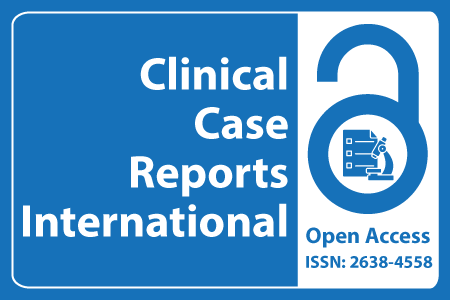
Journal Basic Info
- Impact Factor: 0.285**
- H-Index: 6
- ISSN: 2638-4558
- DOI: 10.25107/2638-4558
Major Scope
- Gastric Cancer
- Genetics
- Hematology
- Family Medicine and Public Health
- Vascular Medicine
- Surgery
- Cancer Clinic
- Forensic and Legal Medicine
Abstract
Citation: Clin Case Rep Int. 2024;8(1):1647.DOI: 10.25107/2638-4558.1647
Successful Outcome of Ineffective Infliximab-Treated Autoimmune Enteropathy with Oral Budesonide: A Case Report
Songfei L and Xueli T
Department of Gastroenterology, Institute of Peking University Third Hospital, China
*Correspondance to: Xueli Tian
PDF Full Text Case Report | Open Access
Abstract:
Introduction: Autoimmune Enteropathy (AIE) is a rare disease that causes chronic diarrhea due to small intestinal villus atrophy. Because of its low morbidity and the lack of specific symptoms, it is often misdiagnosed or delayed in diagnosis. Currently, its treatment also faces great challenges. Case Report: A 35-year-old woman reported persistent diarrhea with significant weight loss for two months. Capsule endoscopy showed a reduction of the small intestinal folds and shortening or disappearance of villi. Small colonoscopy biopsy revealed severe villus atrophy, disappearance of goblet cells, crypt epithelial hyperplasia, crypt apoptosis, and massive lymphoplasmacytic infiltration within the lamina propria. Diseases that could easily cause small intestinal villus atrophy, such as celiac disease and CVID, were ruled out based on medical history and laboratory examination. Thus, AIE was diagnosed. The patient’s diarrhea gradually improved with methylprednisolone 40 mg/d iv. The symptoms worsened again when methylprednisolone was reduced to 12 mg/day, and treatment with infliximab 5 mg/day failed three times. Finally, treatment with oral budesonide (9 mg/day) was initiated. Diarrhea decreased significantly after one week and returned to normal after three weeks, with no recurrence so far. Conclusion: Due to its low morbidity and lack of specific symptoms, it is often misdiagnosed or the diagnosis is delayed. Oral budesonide would still be a preferable option for patients with AIE when traditional hormone dependence and biological agents are ineffective.
Keywords:
Autoimmune enteropathy; Infliximab; Budesonide
Cite the Article:
Songfei L, Xueli T. Successful Outcome of Ineffective Infliximab-Treated Autoimmune Enteropathy with Oral Budesonide: A Case Report. Clin Case Rep Int. 2024; 8: 1647.













